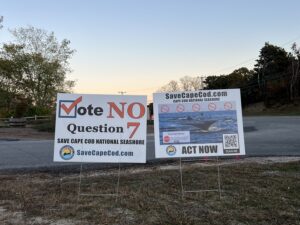TRURO — A fleet of roadside signs urging drivers to “Vote NO” on Question 7 remained on the public right-of-way along Route 6 for weeks before and after election day on Nov. 5, when a mysterious nonbinding referendum on wind power failed by almost 1,400 votes.

The prolonged presence of the signs has highlighted Truro’s decision to suspend enforcement of the town’s temporary sign bylaw, which has been on hold because of a controversy during the town’s annual election in May. After town staff were accused of targeting one select board candidate’s signs — a charge they denied — a series of encounters with angry citizens resulted in the town “pausing” enforcement of its bylaw.
Question 7, which was put on the November ballot with signatures collected by John Leonard of Hingham, had asked voters in the 4th Barnstable District of the state House of Representatives whether they thought their newly elected representative should “be instructed to vote in favor of legislation” to support offshore and onshore wind power development in Massachusetts.
Such “public policy questions” require only 200 signatures to be added to the ballot but do not have any legal effect on state Rep.-elect Hadley Luddy or anybody else in the seven towns in the district: Provincetown, Truro, Wellfleet, Eastham, Orleans, Harwich, and Chatham.
Nonetheless, there was an active campaign to defeat the ballot question. It was organized under the name “Save Cape Cod,” with a website at savecapecod.com — but the campaign’s organizers have not disclosed their names or their sources of funding for the website and roadside signs.
There is also no committee opposing Question 7 registered with the state Office of Campaign and Political Finance (OCPF).
Even though legislative district ballot questions are nonbinding, committees that raise or spend money for or against them are required by state law to disclose their funding sources and expenditures, OCPF communications and education director Jason Tait told the Independent in October.
“One potential penalty” for failing to register is a fine of up to $25 per day, with a maximum penalty of $5,000, Tait said. The final deadline to register and make financial disclosures was election day for committees organized as late as Oct. 16 — but as of Nov. 5, no committee had been registered, Tate confirmed.
Save Cape Cod’s website says it aims to preserve the “unique beauty and historic and cultural significance” of Cape Cod and the Cape Cod National Seashore but provides no identification of sponsors or funders. Since the election, the site has been updated to feature a flyer proclaiming, “The Outer Cape Says NO to Offshore Wind!!!”
Multiple inquiries from the Independent through the website’s contact form were unanswered. Several people who have campaigned locally against offshore wind, including state Senate candidate Christopher Lauzon, have told the Independent they do not know who is behind the Save Cape Cod campaign.
Bylaw in Limbo
Enforcement of Truro’s bylaw regulating temporary signs has remained “paused” for more than six months. The issue dates back to April, when a spate of complaints were filed about the removal of campaign signs supporting Tim Hickey, who ran unsuccessfully for the select board.
Town Manager Darrin Tangeman had instructed DPW staff to remove campaign signs from public property. Many of the removed signs belonged to Hickey, and he accused Tangeman of targeting his campaign and town staff of trespassing to take the signs.
Under Truro’s sign code, temporary signs on public property require planning board approval and are limited to four per event. Signs may remain for up to 15 days for single- or two-day events and 30 days for multi-day events. There are no special provisions for campaign signs in the bylaw.
After the controversy, the planning board discussed the sign code several times and held a community forum on the bylaw. Only two other people attended that Aug. 7 forum, however.
At a planning board meeting two weeks later, board member Anne Greenbaum said, “The short version is that people like our temporary signs because they are well kept and they are not litter.”
Participants also felt that “there are too many temporary signs, and they are not taken down in time,” she said.
Board member Ellery Althaus said that he understood the impulse to regulate all temporary signs but cautioned against expanding regulations, citing concerns about selective enforcement and disputes between neighbors. “I think it is a very slippery slope,” he said.
Board member Paul Kiernan criticized signs advertising businesses with no presence in Truro. Greenbaum said it was important to balance regulations of temporary signs with support for local businesses.
At the Sept. 11 planning board meeting, Greenbaum said she had read through the entirety of the town’s sign code. “It is just headache-inducing,” she said. “For us to dive into the sign code would be a huge undertaking, and I’m not sure it’s a high priority right now.”
By Oct. 9, the planning board had decided to abandon the issue altogether.
“There was very limited public interest in this topic,” said chair Rich Roberts.
In the meantime, enforcement of the temporary signage bylaw is still on pause. Truro Communications and Marketing Coordinator Katie Riconda told the Independent last week that there was no update on the issue but that the town hopes to discuss the sign bylaw at a future select board meeting.



